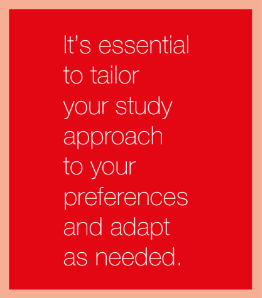10 Study Techniques for Easier Recall
Make Your Studying FUN!
There are various methods to engage in learning and acquire new knowledge. Adhering strictly to the conventional techniques required by tests or assignments is unnecessary. For instance, when writing an essay, it is not solely about studying from books. You can enhance your approach by watching videos, listening to podcasts or developing an infographic to connect your ideas. While the end goal is to produce a well-written piece, the process can be individualised to suit your personal preferences and abilities.
When you’re tackling assignments, it might feel like they’re one-time events.
However, there’s a teaching technique called scaffolding, where your teacher lays down some foundational knowledge that will be added upon later. It might be the next lesson or the following year. It’s not just about finishing the task and handing it in; it’s also about remembering and recalling that information for future learning.
Studying and learning are a dynamic duo involving creating something valuable from knowledge and holding onto that content for the long haul. It’s not a one-and-done deal – it’s an ongoing journey.
Here is a smorgasbord of ideas for you to pick and mix from. Do what lights you up and helps with your memory and recall.
Visual Techniques
• Create mind maps or concept maps to organise information visually.
• Use colourful diagrams and charts, create cartoons, graphs and infographics to represent key concepts.
• Watch educational videos or animations related to the topic.
Auditory Techniques
• Record yourself summarising key points and listen to them while walking to school, in the car, walking the dog or out and about helping with chores.
• Engage in group discussions or study sessions where you can explain concepts aloud. Study Buddies can be extremely valuable in achieving academic success.
• Listen to podcasts or audiobooks to learn, research or review information.
• Write a rap song about your content and record it.

Hands-on Techniques
• Incorporate physical movement into your study routine, such as pacing or bouncing a ball while reviewing.
• Create flashcards and use them actively by sorting, categorising or moving them around. Flashcards are great for understanding and recalling timelines or personality traits of characters.
• Role-play scenarios related to the subject matter to make it more tangible.
• Have a dance party with your favourite songs to re-energise you.
Read/Write Learners
• Summarise information in your own words through writing or typing.
• Create flashcards with questions on one side and detailed answers on the other. This could also be done on a spreadsheet.
• Write a short essay or create a blog post to reinforce understanding.
• Create a science fiction story integrating the key concepts to make it memorable.
Memory Techniques for Recall
• Use mnemonic devices, acronyms or rhymes to remember essential information.
• Chunk information into smaller, more manageable segments.
• Practice retrieval by testing yourself with flashcards or asking someone to quiz you.
Interactive Learning
• Use online platforms or educational apps that provide interactive quizzes and games to learn and reinforce information.
• Gamify your study sessions by turning information into a quiz competition with friends. Kahoot! is great for this!
• Explore virtual simulations or interactive scenarios related to the subject.
Change Study Environment
• Switch locations for studying to stimulate different parts of the brain.
• Create a dedicated and aesthetically pleasing study space to increase focus.
• Use background music or ambient sounds that enhance concentration. Quiet baroque is recommended for this.
Teach the Material
• Pretend to be the teacher and explain concepts to an imaginary audience.
• Collaborate with classmates and take turns teaching each other specific topics.
• Create tutorial videos or presentations to reinforce your understanding.
Mindfulness and Relaxation Techniques
• Incorporate mindfulness or meditation exercises to reduce stress. Stress inhibits your ability to learn, retain and recall information.
• Practice deep diaphragmatic breathing before and during study sessions to stay calm and focused.
• Take short breaks to stretch and relax your mind.
Utilise Technology
• Explore educational apps, virtual reality, escape rooms or augmented reality experiences.
• Make use of online collaborative tools for group projects or study sessions.
• Set up virtual study groups for discussions and mutual support.
Remember that a combination of these methods may work best for you. It’s essential to tailor your study approach to your preferences and adapt as needed. Experiment with different techniques to discover what resonates with you, making the learning process more enjoyable and memorable.
Published on Thursday, February 15th, 2024, under Learning, Study Skills
